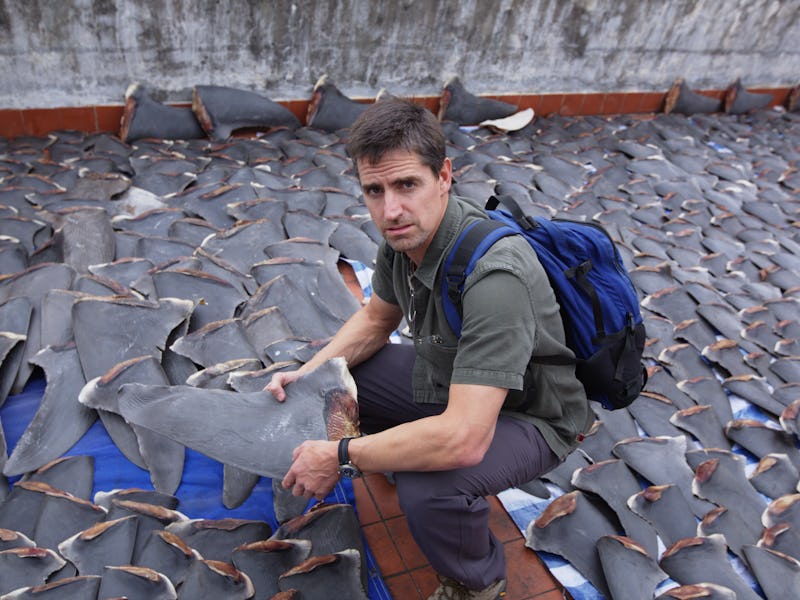With ‘Racing Extinction,’ Discovery Bets on Ecological Outrage as Good TV
The former home of scientifically questionable shark shows is building an expanded universe of environmental superheroes.

With this week’s much-publicized release of Racing Extinction, a documentary about efforts to fight climate change and protect endangered species, slick, Hollywood-style productions about conservationism went mainstream. Consider this: Discovery Channel’s massive audience was built on Shark Week! and Alaskan crab fishermen, and the people responsible for programming gave a spin off show to the ocean itself.
Well, that’s probably overstating things. In reality, Discovery Channel’s newest offering is still anthro-centric. The key difference is the sort of human avatar for wildness standing center stage. Instead of tough guys, viewer meet filmmaker Louis Psihoyos, a man straight out of the Monkeywrench Gang.
The documentary’s opening scene shows two undercover agents catching an upscale California sushi restaurant serving illegal endangered whale meat. It’s tense. It’s dramatic. It’s exactly the sort of storytelling that’s going to sell environmental activism to the masses.
Psihoyos is unabashed about his desire to reach the broadest audience possible. His previous effort, The Cove, won the Oscar for best documentary, but with Racing Extinction, he’s in it for the eyeballs. “I keep reminding myself that the reward is getting potentially a billion people to see the film,” Psihoyos told Variety. “To me, that is way bigger than an Academy Award.”
That goal aligns nicely with the aims of the Discovery Channel, which threw the entire weight of its massive marketing machine behind the film. Discovery Communications, the mothership, is a massive force in television. The flagship needs a flag to plant.
A diver swims with a manta ray, one of the at-risk species featured in 'Racing Extinction.'
Other environmental documentaries have achieved varying levels of acclaim and popular success. An Inconvenient Truth really launched the genre in 2006, capturing the public imagination and inspiring people to act in small ways in their own lives to combat climate change. “It was a game changer,” Betsy McLane, author of the second edition of A New History of Documentary Film, tells Bloomberg. “People actually went out and bought Priuses.”
And Blackfish, the documentary that exposed the industry of keeping Killer Whales in captivity for human entertainment, has led to SeaWorld promising that its grotesque circus acts will end in 2017 (the company still plans to keep orcas in more nature park-like displays).
Racing Extinction uses the same thriller tactics that made The Cove a sensation, and takes them to the next level. It’s got the production values of a David Attenborough nature doc, the populist bent of Kony 2012, and the sometimes-illegal-but-morally-self-righteous hijinx of The Yes Men.
The activist filmmakers behind 'Racing Extinction' project a whale onto the Empire State Building.
For the Discovery Channel, investing in the eco-angry future means cleaning up the network’s reputation as a purveyor of cheap, non-scientific docu-tainment. They’re on it. The credibility biz is unforgiving, and the public isn’t likely to take any more bad-science gaffs like fake Shark Week claims, and unfulfilled promises like watching a man get swallowed alive by a snake.
Entertainment pseudo-science is dead, long live entertainment.
If Racing Extinction is the signal of what’s to come, science is going to have a seat at the table. But the scientists will be supporting characters. The heroes are the activists who get themselves into tight spots in the name of saving the world.